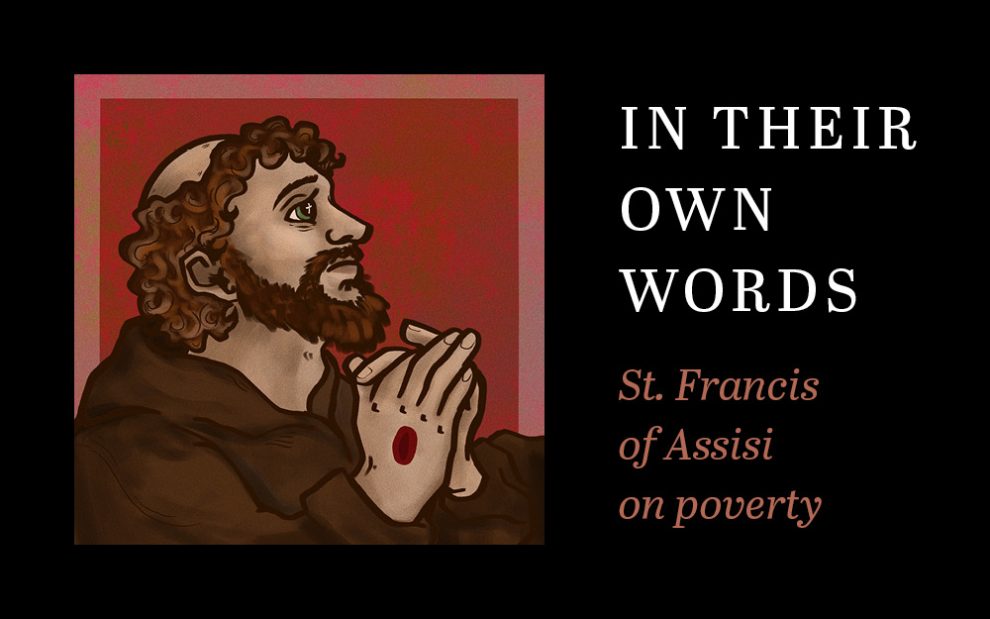In Their Own Words is a new web column from U.S. Catholic. In these essays, academics and other experts provide short, evidence-based explanations of prominent Catholic figures’ views on an array of topics of interest to the church and offer resources for finding further accurate information.
St. Francis of Assisi (ca. 1182–1226) is one of the most popular saints in Christian history—but with great popularity comes the greater likelihood of stereotyping and caricature. Consider the many false quotes that get attributed to him on social media. There is also the tendency to reduce his spirituality to something superficial or simplistic. Francis’ love for all of creation, for instance, has inspired the blessing of pets and other animals on his feast day but has not necessarily translated into any genuine love of our fellow creatures—a point Pope Francis made in his 2015 encyclical letter Laudato Si’ (On Care for Our Common Home), itself directly inspired by the reformer from Assisi.
St. Francis is also known for his love for the poor and outcast as well as his voluntary embrace of poverty. This concern for the poor is what Pope Francis identified as the reason he was inspired to take the name Francis after his election as pope in 2013. But many have misunderstood or misinterpreted St. Francis’s embrace of poverty.
At the heart of the misunderstanding stands a lack of appreciation for the range of meanings that exist for the single word “poverty.” When most people hear the word, they understandably think of material or abject poverty—the lack of those essential goods (food, clothing, shelter, health care, etc.) that are necessary for basic human flourishing. Abject poverty is never a good nor is it something to be praised or celebrated. All we have to do is look to the Bible to see the many ways that God condemns the powerful, when they allow this kind of poverty in their communities.
When we assume that St. Francis championed this kind of abject or material poverty, we can mistakenly end up celebrating an evil, the privation of those essential goods for human flourishing. Over the centuries, this sort of misunderstanding has led to distorted spiritualities that miss St. Francis’ real intentions.
Another distortion arises from misreading Matthew 5:3 “Blessed are the poor in spirit,” as suggesting that God only cares about our hearts, not our actions. This distortion has led some wealthy and powerful people to think that they can hoard wealth and treat others in any way they please. But this is not the kind of poverty St. Francis had in mind.
St. Francis challenged others to embrace evangelical poverty: that is, the kind of poverty modeled by Jesus Christ. Evangelical poverty never treats poverty as an end in itself. On the contrary, the evangelical poverty Jesus modeled is a way of prioritizing and building relationship with everyone one encounters.
When writing about poverty in the Regula bullata—the official religious Rule or way of life of the Franciscans—St. Francis doesn’t use the term people usually associated with religious vows. Instead, he says that the Franciscan friars are to live “without anything of one’s own” (or sine proprio in Latin). He understands evangelical poverty as a surrender of ownership, control, and power over anything that gets in the way of relationship. The more property one acquires, the more preoccupied one becomes with protecting it and keeping it from others.
St. Francis explicitly ties this surrendering of ownership to the capacity to embrace anyone God sends their way. He writes in his first Rule (Regula non bullata), “Wherever the brothers may be, either in hermitages or other places, let them be careful not to make any place their own or contend with anyone for it. Whoever comes to them, friend or foe, thief or robber, let him be received with kindness.”
This principle of poverty is how Jesus lived in the world. When Jesus said that “Foxes have dens and birds of the air have nests, but the Son of Man has no place to lay his head” (Matt 8:20), he points to the fact nothing got in his way when encountering others. He opened himself to radical interdependence that necessitates relationship. Likewise, St. Francis did not want property and possessions to prevent him from fully encountering the people God placed in his path.
Evangelical poverty also has a spiritual character. It means getting rid of the views, prejudices, and desires that prevent authentic relationship. In some cases, it can be harder to surrender those nonmaterial things than to give up our material belongings. St. Francis knew that preconceived judgements about others—on the grounds of social status, religious affiliation, or something else—prevent Christians from following Jesus Christ in accepting the full humanity of all the people one encounters.
For this reason, St. Francis was initially skeptical of higher education, forbidding his brother friars from advanced studies for fear it would go to their heads and distance them from others. He also refused to adopt formal hierarchical titles for his community, shunning “superior” and “prior” and embracing “brother” and “minister.” He writes in his first Rule: “Let no one be called ‘prior,’ but let everyone in general be called a lesser brother. Let one wash the feet of the other.”
So, for St. Francis, as for Jesus before him, the poverty God calls Christians to embrace is always a means to a greater end, the capacity for relationship with others. It is a path toward communion that requires humility and love. In surrendering both material and nonmaterial possessions that impede authentic communion with our siblings in the world, we can grow in our appreciation for our inherent interdependence and love for one another.
Image: Dani Jimenez















Add comment